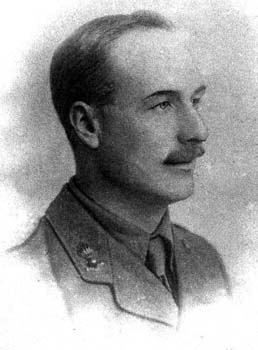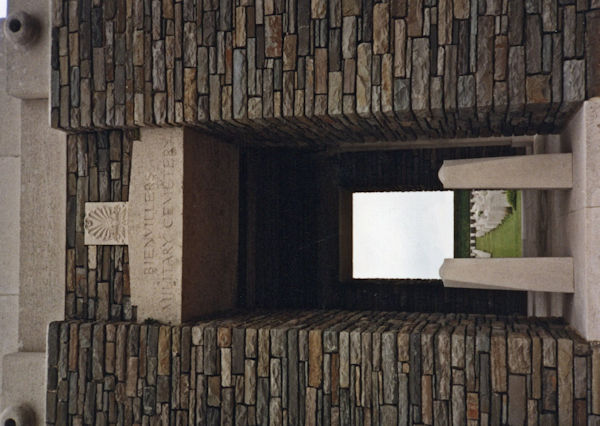Name
Charles Clark (MC)
22 December 1994
Conflict
First World War
Date of Death / Age
25/04/1918
33
Rank, Service Number & Service Details
Major
Royal Field Artillery
295th Brigade
73 Battery
Awards: Service Medals/Honour Awards
1914 (Mons) Star, British War and Victory Medals
Military Cross
Cemetery/Memorial: Name/Reference/Country
BIENVILLERS MILITARY CEMETERY
XVII. B. 10.
France
Headstone Inscription
INTO THY HANDS O LORD I COMMEND MY SPIRIT LORD RECEIVE MY SOUL R.I.P.
UK & Other Memorials
St James’ Church Memorial, Thorley, Working Men’s Club / Village Hall, Memorial, Thorley, Bishop's Stortford Baptist Church Memorial(*1), Not on the Bishop's Stortford Town Memorial(*1)
Pre War
Charles was born in Thorley, Herts on 22 December 1884, the son of James and Jane Clark, and was baptised at St James the Great, Thorley, on 13 February 1885. On the 1901 Census he was living with his family at Moor Hall Cottages, Thorley, and working as an agricultural labourer. He joined the Royal Horse Artillery in 1902 and by 1911 he had been promoted to Corporal and was stationed in Mhow, India.
It is not known when or where he married, but his wife Emily was living at "Chrysanthemum", Thorley Houses, Thorley, Bishop's Stortford at the time of his death.
Wartime Service
At the outbreak of war, Charles was still in India but had been promoted to Serjeant (service no. 16566). He returned to England in January 1915 and received a commission in the Royal Horse Artillery before going to Gallipoli on April 25th, 1915. It was there that he won the Military Cross for fixing wires and getting a message to Headquarters some time before the next message got through. He was one of the first to land and almost the last to leave in the evacuation of the Peninsular.
This is an extract from a letter to his wife in June 1916 which was published in the Herts & Essex Observer :
“I don’t think I ever told you how I managed to win the MC. It was the last day but one on the Peninsula before we were evacuated, the Turks gave us a terrible bombardment and I was forward in the trenches. The whole of my show, which I had only just left, was blown to pieces and all the telephone wires were broken. After bombarding most of the day they attacked us, but were driven back with a good many casualties. With the help of my telephonist Bdr Taylor (one of my boys of ‘Y’ Battery) who has been awarded the DCM, I managed to fix one wire and get a report back to the Battery and Headquarters. This was the first they had received, by some hours, and of course was the reason why they took so much notice of it. Altogether, it was a hot show, and not a job which I should care about often. Of course, I am proud of my honour, not only the decoration itself, but to know that I have been able to satisfy my seniors with my work. The man who was with me the whole time (Bdr Taylor) well deserves his decoration, as he worked hard with me then, and also on several previous occasions. He was one of the first to land on W beach with the Lancashire Fusiliers.”
Subsequently, he went to France, where he was made Lieutenant, and later he was promoted to Captain in the Royal Field Artillery. Only a few weeks before his death he was promoted to the rank of acting Major. He was killed in action at Bienvillers-au-Bois on April 25th 1918.
Additional Information
Four sons served and three were killed: Charles, James and Joseph, with William surviving. www.friends-stjames.org The following was taken from a newspaper cutting published in February 1919 and mainly relates to Charles’ brother, Joseph: 'General sorrow has been caused in Thorley by the death on Tuesday, from pneumonia, of Trooper Joseph Walter Clark, of the Hertfordshire Yeomanry, the fourth son of Mr and Mrs James Albert Clark of Moor Hall Cottages, Thorley. The deceased, who was in the Hertfordshire Constabulary before joining the Army, had served abroad in France, Egypt, Palestine and Syria and only returned last week after an absence abroad of over two years. His eldest brother, Major Charles Clark, M.C., of the Royal Field Artillery, was killed in action in France last April; and another brother, Sergeant Albert James Clark, of the Army Veterinary Corps, died last May. The coffin, wrapped in the Union Jack, was carried into the church by a detachment of the Hertfordshire Yeomanry …… who fired three volleys over the grave ……… The grave was lined with evergreens.'
*1 There are two 'C' Clark(e)s with a connection to Bishop's Stortford or nearby, Charles John Clark (Town memorial) and Charles Clarke (Baptist Church), because of the ‘J’ we can be reasonably confident that the former man (not this man) and is on the ‘Town’ memorial. Our assumption that Major Charles Clarke (MC), is the man appearing on the Baptist memorial, because of the ‘e’ on Clarke is perhaps less certain and may be as misspelling of the former.
Acknowledgments
Brenda Palmer
John E. I. Procter (Rector of Thorley), Bill Hardy, Philip Hargrave - www.friends-stjames.org, Jonty Wild



